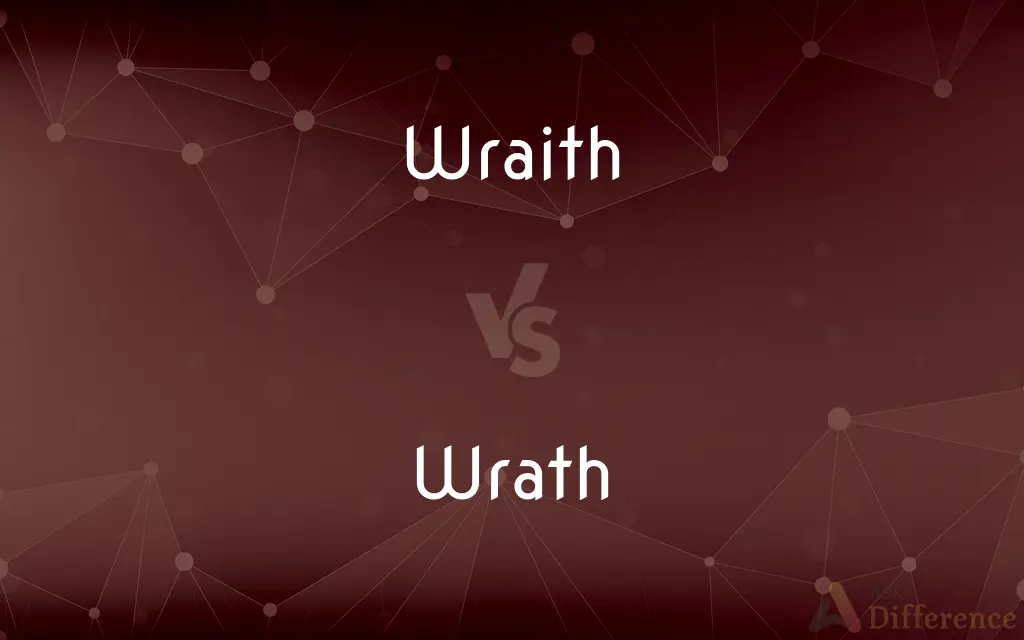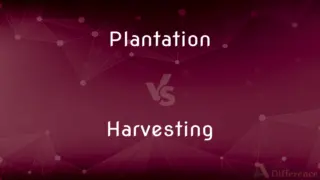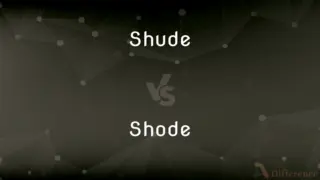Wraith vs. Wrath — What's the Difference?
By Tayyaba Rehman & Fiza Rafique — Updated on April 8, 2024
Wraith refers to a ghost or ghostlike image of someone, especially seen shortly before or after their death, while wrath denotes intense anger.

Difference Between Wraith and Wrath
Table of Contents
ADVERTISEMENT
Key Differences
A wraith is often depicted in folklore and fiction as a spectral figure, representing someone who has died or an apparition foretelling death. This concept is rooted in supernatural beliefs and the idea of spirits lingering after death. Wrath, on the other hand, is a powerful emotional state, embodying extreme anger or divine punishment, and is associated with both human emotions and mythological or religious contexts.
While a wraith embodies the idea of a spirit or soul's appearance after physical death, suggesting a presence that is ethereal and not of this world, wrath focuses on the intensity of anger and often implies a response to injustice or wrongdoing. Wrath can be directed by individuals or attributed to deities as a form of divine retribution.
The appearance of a wraith in stories often serves as an ominous sign or a call to action, symbolizing unresolved issues or the consequences of past actions. Wrath, in contrast, may lead to decisive actions driven by strong feelings of anger, seeking to address or avenge perceived wrongs.
Wraiths are typically associated with specific locations or objects, haunting places connected to their lives or deaths. This contrasts with wrath, which can arise in any context where there is perceived injustice, making it more about the emotional response than a physical manifestation.
The concept of a wraith is primarily a part of ghostly folklore and the supernatural genre, offering a narrative device for exploring themes of death, loss, and the afterlife. Wrath, while it can feature in similar narratives, is a universal emotion, relevant across all genres and real-life situations, reflecting the depth and complexity of human and divine responses to provocation.
ADVERTISEMENT
Comparison Chart
Definition
A ghost or ghostlike image of someone.
Intense anger.
Context
Supernatural and folklore.
Emotional and religious contexts.
Representation
Ethereal, spectral figure.
Emotional state or divine punishment.
Purpose/Effect
Omen, unresolved issues, connection to specific locations.
Response to injustice, action driven by anger.
Associated With
Death, afterlife, and the supernatural.
Human emotions, divine retribution.
Compare with Definitions
Wraith
A ghostly apparition resembling a dead person.
They say a wraith haunts the old mansion, appearing on the anniversary of its owner's death.
Wrath
Divine punishment for sin.
In many religions, floods and fires are seen as expressions of divine wrath.
Wraith
A warning or symbol of death.
The appearance of a wraith in dreams is often considered a bad omen.
Wrath
Extreme or violent anger.
His face turned red with wrath when he learned of the betrayal.
Wraith
Something vague or insubstantial.
In the fog, the ship appeared as a wraith, almost entirely obscured.
Wrath
A forceful action or condition resulting from anger.
She feared the wrath of her strict parents.
Wraith
A thin, ghostlike image of a person.
The illness left him a wraith of his former self.
Wrath
Intense emotional response to perceived wrongs.
The unjust decision sparked wrath among the community members.
Wraith
A visible spirit after someone's death.
After the battle, a wraith was seen wandering the field, as if searching for peace.
Wrath
A state of being very annoyed or displeased.
He could barely contain his wrath during the meeting.
Wraith
A ghost or ghostlike image of someone, especially one seen shortly before or after their death.
Wrath
Extreme anger
He hid his pipe for fear of incurring his father's wrath
Wraith
An apparition of someone that is believed to appear as a portent just before that person's death.
Wrath
Forceful, often vindictive anger.
Wraith
The ghost of a dead person.
Wrath
Punishment or vengeance as a manifestation of anger.
Wraith
Something faint or insubstantial
"The wraith of a hollow laugh issued silently from his parted lips" (F. Scott Fitzgerald).
Wrath
Wrathful.
Wraith
A ghost or specter, especially a person's likeness seen just after their death.
Wrath
Great anger.
Homer relates an episode in the Trojan War that reveals the tragic consequences of the wrath of Achilles.
Wraith
An apparition of a person in his exact likeness, seen before death, or a little after; hence, an apparition; a specter; a vision; an unreal image.
She was uncertain if it were the gypsy or her wraith.
O, hollow wraith of dying fame.
Wrath
(rare) Punishment.
Wraith
Sometimes, improperly, a spirit thought to preside over the waters; - called also water wraith.
Wrath
Wrathful; wroth; very angry.
Wraith
A mental representation of some haunting experience;
He looked like he had seen a ghost
It aroused specters from his past
Wrath
(obsolete) To anger; to enrage.
Wrath
Violent anger; vehement exasperation; indignation; rage; fury; ire.
Wrath is a fire, and jealousy a weed.
When the wrath of king Ahasuerus was appeased.
Now smoking and frothingIts tumult and wrath in.
Wrath
The effects of anger or indignation; the just punishment of an offense or a crime.
Wrath
See Wroth.
Wrath
To anger; to enrage; - also used impersonally.
If him wratheth, be ywar and his way shun.
Wrath
Intense anger (usually on an epic scale)
Wrath
Belligerence aroused by a real or supposed wrong (personified as one of the deadly sins)
Common Curiosities
Is wrath always negative?
While wrath is generally seen as negative due to its association with anger, it can also motivate actions against injustice.
What does wrath mean?
Wrath refers to intense anger, often with an implication of vengeance or divine punishment.
Are wraiths always malevolent?
Not always. While wraiths can be seen as ominous, their intentions or nature vary widely in different stories and beliefs.
Can wraiths interact with the living?
In folklore and fiction, wraiths sometimes interact with the living, often as omens or messengers from the afterlife.
Do all cultures have concepts of wraiths?
Many cultures have concepts of ghosts or spectral figures, though the specific characteristics and names, like wraiths, can vary.
What is a wraith?
A wraith is a ghostly figure, often associated with someone's death or appearing as a spectral vision.
Can wrath be justified?
Wrath can be seen as justified in response to clear wrongdoings or injustices, though its expression needs careful consideration to avoid harm.
How can one manage wrath?
Managing wrath often involves recognizing the triggers, understanding the underlying causes, and finding constructive outlets for anger.
Is it possible to communicate with a wraith?
In stories and lore, communication with wraiths is sometimes possible, though it often requires special circumstances or abilities.
How does one differentiate between wrath and other forms of anger?
Wrath is distinguished by its intensity and, often, its association with moral outrage or divine retribution.
Can wraiths be benevolent?
Yes, in some narratives, wraiths act as protectors or guides, showing benevolence towards certain individuals.
What are the consequences of wrath?
The consequences can range from personal strife and damaged relationships to broader societal impacts when actions are taken in anger.
What triggers wrath?
Wrath can be triggered by perceived injustices, betrayal, or any action that deeply violates someone's principles or sense of fairness.
Is the concept of a wraith found in all supernatural beliefs?
While not universal, the concept of spectral entities or ghosts akin to wraiths is widespread across various cultures and supernatural beliefs.
Does seeing a wraith predict death?
In some tales, seeing a wraith is an omen of death, either of the observer or someone close to them.
Share Your Discovery

Previous Comparison
Plantation vs. Harvesting
Next Comparison
Shude vs. ShodeAuthor Spotlight
Written by
Tayyaba RehmanTayyaba Rehman is a distinguished writer, currently serving as a primary contributor to askdifference.com. As a researcher in semantics and etymology, Tayyaba's passion for the complexity of languages and their distinctions has found a perfect home on the platform. Tayyaba delves into the intricacies of language, distinguishing between commonly confused words and phrases, thereby providing clarity for readers worldwide.
Co-written by
Fiza RafiqueFiza Rafique is a skilled content writer at AskDifference.com, where she meticulously refines and enhances written pieces. Drawing from her vast editorial expertise, Fiza ensures clarity, accuracy, and precision in every article. Passionate about language, she continually seeks to elevate the quality of content for readers worldwide.















































